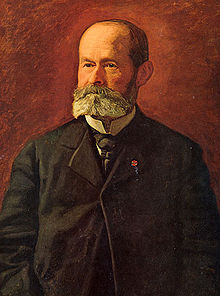- Daniel Garrison Brinton
-
Daniel Garrison Brinton (May 13, 1837 – July 31, 1899) was an American archaeologist and ethnologist.
Contents
Biography
Brinton was born in Thornbury Township, Chester County, Pennsylvania. After graduating from Yale University in 1858, Brinton studied at Jefferson Medical College for two years and spent the next travelling in Europe. He continued his studies at Paris and Heidelberg. From 1862 to 1865, during the American Civil War, he was a surgeon in the Union army, acting during 1864-1865 as surgeon-in-charge of the U.S. Army general hospital at Quincy, Illinois. Brinton was sun-stroked at Missionary Ridge (Third Battle of Chattanooga) and was never again able to travel in very hot weathers. This handicap affected his career as an ethnologist.
After the war, Brinton practiced medicine in West Chester, Pennsylvania for several years; was the editor of a weekly periodical, the Medical and Surgical Reporter, in Philadelphia from 1874 to 1887; became professor of ethnology and archaeology in the Academy of Natural Sciences in Philadelphia in 1884; and was professor of American linguistics and archaeology in the University of Pennsylvania from 1886 until his death.
He was a member of numerous learned societies in the United States and in Europe and was president at different times of the Numismatic and Antiquarian Society of Philadelphia, of the American Folklore Society, the American Philosophical Society, and of the American Association for the Advancement of Science.
At his presidential address to the American Association for the Advancement of Science in August 1895, Brinton advocated theories of scientific racism that were pervasive at that time. As Charles A. Lofgren notes in his book, The Plessy Case, although Brinton "accepted the 'psychical unity' throughout the human species," he claimed "all races were 'not equally endowed,' which disqualified [some of] them from the atmosphere of modern enlightenment." He asserted some have "...an inborn tendency, constitutionally recreant to the codes of civilization, and therefore technically criminal." Further, he said the characteristics of "races, nations, tribes...supply the only sure foundations for legislation, not a priori notions of the rights of man."[1]
Brinton was an anarchist during his last several years of life. In April 1896, he addressed the Ethical Fellowship of Philadelphia with a lecture on "What the Anarchists Want," to a friendly audience. In October 1897, Brinton had dinner with Peter Kropotkin after the famous anarchist's only speaking engagement at Philadelphia. Kropotkin had refused invitations from all of the city's elites. [2] [3]
On the occasion of his memorial meeting on October 6, 1900, the keynote speaker Albert H. Smyth stated: "In Europe and America, he sought the society of anarchists and mingled sometimes with the malcontents of the world that he might appreciate their grievances, and weigh their propositions for reform and change." [4]
Works
From 1868 to 1899, Brinton wrote many books, and a large number of pamphlets, brochures, addresses and magazine articles. His works include:
- A study in the native religions of the western continent.
- Library of Aboriginal American Literature. No. VIII
- american authors and their productions
- Nagualism, A Study in Native American Folk-lore and History (1894)
- Ancient nahuatl poetry
- The Myths of the New World (1868), an attempt to analyse and correlate, scientifically, the mythology of the American Indians
- The Religious Sentiment: its Sources and Aim: A Contribution to the Science and Philosophy of Religion (1876)
- American Hero Myths (1882)
- The Annals of the Cakchiquels (1885)
- The Lenâpé and their Legends: With the Complete Text and Symbols of the Walam Olum (1885)
- Essays of an Americanist (1890)
- Races and Peoples: lectures on the science of ethnography (1890);
- The American Race (1891)
- The Pursuit of Happiness (1893)
- Religions of Primitive People (1897)
In addition, he edited and published a Library of American Aboriginal Literature (8 vols. 1882-1890), a valuable contribution to the science of anthropology in America. Of the eight volumes; six were edited by Brinton himself, one by Horatio Hale and one by Albert Samuel Gatschet. His 1885 work is notable for its role in the Walam Olum controversy.
References
- ^ Charles A. Lofgren, "The Plessey Case: A Legal-Historical Interpretation, Oxford University Press (1988), pp. 104-5. ISBN 0195056841
- ^ The Conservator, October 26th, 1897
- ^ Letters, Brinton to Horace Traubel, April 26 & 27, 1896. Special Collections Dept., Temple University
- ^ Proceedings of the American Philosophical Society January 16, 1900, keynote address by Albert H. Smyth.
 This article incorporates text from a publication now in the public domain: Chisholm, Hugh, ed (1911). Encyclopædia Britannica (11th ed.). Cambridge University Press.
This article incorporates text from a publication now in the public domain: Chisholm, Hugh, ed (1911). Encyclopædia Britannica (11th ed.). Cambridge University Press.External links
Categories:- 1837 births
- 1899 deaths
- People from Chester County, Pennsylvania
- American ethnologists
- American archaeologists
- American Mesoamericanists
- Historians of Mesoamerica
- Mesoamerican anthropologists
- 19th-century Mesoamericanists
- Scientific racism
- American Civil War surgeons
- Military physicians
- American anarchists
Wikimedia Foundation. 2010.

